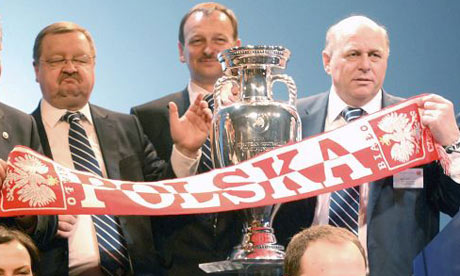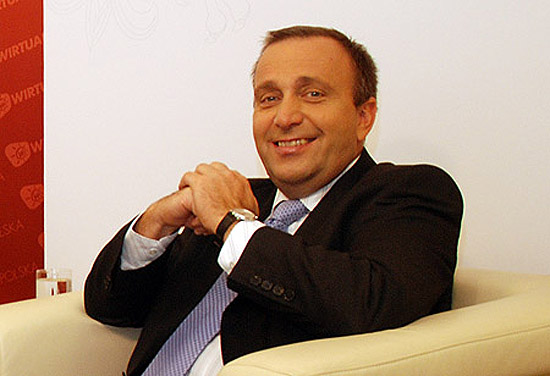From:
WSJ Poland and Dutch insurer Eureko BV have settled a nearly decade-long dispute over a botched privatization, going a long way to repairing Poland's reputation among foreign investors and saving the country from a potential $12.1 billion payout in an international arbitration case.
Analysts consider the difficult and complex deal a major victory for the ruling Civic Platform party, which has been accused of passivity since taking office in late 2007, and comes just in time to draw attention away from allegations that two top party officials have been involved in illegal lobbying.
"This is definitely a success and it's good that normal investment conditions are returning to Poland," said Pawel Swieboda, chief executive of DemosEuropa, a Warsaw-based think tank. "This conflict was turning investors off the country."
An element of the historic settlement is the high-profile initial public offering of insurer Powszechny Zaklad Ubezpieczen SA, or PZU, on the Warsaw Stock Exchange sometime in the first half of 2010, which will make it one of the largest companies by market capitalization in Poland.
Moreover, the resolution of the dispute unlocks a payout of three years' worth of dividends, 12 billion zlotys, a development anxiously awaited by various investors who have bought PZU employee shares off-market, as well as Poland's Finance Ministry concerned with a ballooning budget deficit and Eureko.
Negotiations between successive Polish administrations and Eureko had stalled until the effects of global economic slowdown - the need for funds - brought both sides back the bargaining table.
The dispute started when, in 2001, Poland refused to honor a 1999 agreement to complete PZU's privatization, which would have allowed Eureko to acquire a controlling stake in the company. Poland holds 55.1% of PZU, while Eureko has 32.1%.
Eureko claimed Poland's breach of contract had cost it the chance to buy shares at a lower price in the past and to raise PZU's value through its leadership.
Under the terms of the Friday agreement, Eureko will gradually reduce its stake in PZU, and will drop an arbitration case against Poland in exchange for compensation of PLN4.77 billion, several times less than the PLN35 billion or so Eureko initially demanded.
"We have accomplished our goal of regaining control of PZU and structuring Eureko's controlled exit out of the company," Treasury Minister Aleksander Grad told a news conference. "This unblocks PZU's growth."
The Treasury and Eureko will both sell stakes in PZU in an IPO likely to be held next year. Poland will pay Eureko compensation partly from its dividend proceeds and partly from the sale of a 5% stake in PZU sold in the IPO. Meanwhile, the state budget will receive PLN3.4 billion in dividends from PZU.
While Poland has weathered the global crisis relatively unscathed so far, it faces a ballooning budget deficit and needs structural reforms to unlock further growth potential and reduce surging public debt.
The ruling Civic Platform party, which has a majority in Parliament, has shied away from any ambitious and socially painful, economic reforms for fear that they will be immediately vetoed by President Lech Kaczynski, whose twin brother, Jaroslaw, heads the opposition Law and Justice party.
"The government is waiting out this term - and limiting itself to the bare minimum - in the hopes of winning both the next parliamentary and presidential elections," said Swieboda of DemosEuropa. "And it has given voters to understand it will take on ambitious reforms then."
Concerns that PZU would sell large amounts of its portfolio of bonds to pay the dividend and that Eureko would exchange its part of the dividend plus billions of zlotys in compensation into euro, weighed on both the zloty and Polish bonds in past weeks.
Treasury Minister Grad reiterated PZU would conduct the payout in a way designed not to disturb markets, while PZU Chief Executive Andrzej Klesyk said the company won't need to sell its portfolio of treasury bonds to fund its dividend payment, as it had secured commitments from banks for PLN32 billion in loans for the purpose.
The zloty strengthened 1.5% against the euro after Grad's statement.
Citing transcripts of wiretapped phone calls recorded by anti-corruption investigators, Polish daily Rzeczpolpolita reported that Zbigniew Chlebowski, a prominent Civic Platform politician, was trying to give assurances to his friend, an owner of a gambling company, that the government would scrap proposed tax hikes on gambling, which were expected to bring in PLN469 million extra budget revenue.
At a news conference later Thursday, Chlebowski said he had been involved in "unfortunate conversations" with the businessman but denied doing anything illegal or trying to shape the legislation.
















































